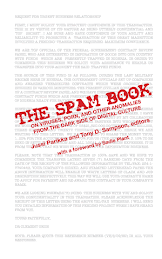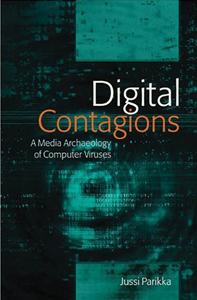This short text was written for the publication our Publishing MA students are doing; Click of Time: Reflections on the Digital Age, aimed at a wider audience, also as marketing material for the great work the MA is doing! Hope our planned new MA Cultures of the Digital Economy can do the same (we hope its running in September 2011).
6 Theses Concerning the Digital Economy and Creative Industries
1. There are already too many theses concerning new media culture. Since its inception, new media, new technologies and the presumed new economies have been the object of wild fantasies, unrealistic aspirations and wet dreams. As much as with the utopian discourses concerning the industrial revolution, the post-industrial, digital revolution was seen at least since the 1990s as the big turn. The assumption: everything changes. We need new signposts, new coordinates and new ways of thinking. The project of humanities was to become the market branding team for the new technological and economic revolution. Still remember Nicholas Negroponte? Still remember the enthusiasm of Mondo 2000, early Wired and others? Still remember the drastic changes from atoms to worlds of bits that was supposed to be changing the way we think about the world?
2. There is not much new about new media. Not that I want to say that its all been there before, however, to paraphrase a Finnish social scientist Mika Pantzar, nothing is so worn out and old than the continuous talk of the new. Indeed; part of the boom since the 1990s, when everything was supposed to change, was the methodological and consistent forgetting of history. Hence, it is no wonder that in the midst of the 1990s boom such new fields as media archaeology that investigated the complex relations and borrowings from the old of new media culture emerged. Oh yes, the new has been before. The old was once new too.
3. There is not much new about new technologies. Much of the dream machines that are supposed to bring new value, new ideas, new connectivity are actually based on old ideas. The computer is not really that new media, but born in the after wake of WW II. The network society has been emerging since the 1960s; email and information capital since the 1970s. 1960s and 1970s research labs came up with the ideas of mobile content, ebooks, collaboration with online documents, a variety of graphical user interfaces and tele-work. The principle of the Web was mapped in the early 1990s; the assumption seems to be that we just need constant upgrading to keep up and keep the idea lucrative for the business discourse (Web 2.0, Web 3.0, Web 4.0…). What we are living in is less a culture of new technologies, but a culture of upgrading as the constant logic of futurity of capitalism.
4. There is nothing much new about the new, digital economy. This is what the 1990s dot.com bubble-become-crash was all about (not coming up with any real income streams and business models) and this is what the current hype about digital economy is about in different fashion. Not surprisingly, the most interesting perspectives on the ‘new’ economy are able to point about how it draws on some seemingly ancient forms of power and political economy. Michael Hardt and Antonio Negri, perhaps the most recognized critics of contemporary capitalism, talk about the return of the rent as a primary mode of extraction of value from the commons; writers such as Matteo Pasquinelli brand our age as one of digital neo-feudalism where the ownership of the infrastructure of communications remains tightly in the hands of few ‘landlords’ while facing ‘a multitude of cognitive workers forced to ‘creativity’.’ The digital economy seems to be a promise of a generalised mode of productive forces from the media to the universities combined with creative industries; however, supportive mechanisms for such fields are at the same time being drastically reduced as with the funding cuts to universities.
5. Creativity is no automatic bliss. Working overtime without compensation, having no other means of income generation besides your skills, brains, bodies and health, being forced into precarious jobs without a promise of a steady income – this characterises as much the contemporary digital economy as does the celebration of crowd-sourcing, collaborative work, participatory culture. Increasingly, the ideas of collaboration, openness and creativity are being harnessed as part of economic doctrines in a manner of parasitic adaptation. I have referred to this earlier as ‘viral capitalism’ – the power of adaptation, subsumption and viral attachments through which critical ideas are turned as part of accumulative value creation. What is often less talked about is labour – the work put into creativity, which is not only a sudden burst of inspiration but takes time, energy and such resources that are not directly monetary but still essential for value creation. The digital artisans are not automatically the new ‘happy class’, but ridden with new mental and physical symptoms of the digital economy; work fatigue, family problems due to overtime, stress-related new disease syndromes…
6. Much of the talk about digital economy is not really that much about the digital. Paradoxically, the systematic and even discriminatory identification of the digital with its technological and mathematical roots misses the point. The Digital Economy Bill and other initiatives by the Government are keen on building infrastructures and maintaining through such hard(ware) measures the competitiveness of the British economy vis-à-vis other networked countries. As part of this and the economic crisis of 2008-2009, the emphasis on sustaining STEM (mathematics, science, ICT and design technology) subjects has also grown; these are seen as the key fields for the future of the digital Britain, whereas the constant attacks against arts and humanities have targeted the wider groups of digital artisans and their expertise. There is no denying that the humanities of the future (oh well, today as well) need to be a new kind of mix between science, technology and critical, historical humanities epistemologies. Yet, the reliance on the primacy of STEM misses the rhizomes. Digital creativity does not grow only of laboratories of computers and such, but from rhizomatic, spreading, uncontained laboratories of experimentality, thinking and artistic methodologies. This is where the computer culture was born – from new alliances of the avant-garde arts and media labs and that is where the new ideas for exciting futures should come from. We need more Stockhausen, Stelarc and Eno – less Gates, Zuckerberg and Mandelsson.
Subscribe to:
Post Comments (Atom)








Wow, never thought there was so much ideology in new media theory. A real eye-opener!
ReplyDelete